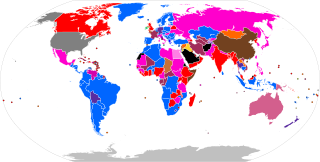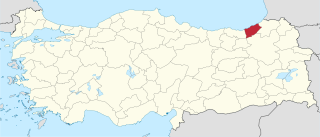
Proportional representation (PR) refers to a type of electoral system under which subgroups of an electorate are reflected proportionately in the elected body. The concept applies mainly to political divisions among voters. The essence of such systems is that all votes cast – or almost all votes cast – contribute to the result and are effectively used to help elect someone – not just a bare plurality or (exclusively) the majority – and that the system produces mixed, balanced representation reflecting how votes are cast.

Party-list proportional representation (list-PR) is a subset of proportional representation electoral systems in which multiple candidates are elected through their position on an electoral list. They can also be used as part of mixed-member electoral systems.
The electoral threshold, or election threshold, is the minimum share of all the votes cast that a candidate or political party requires to achieve before they become entitled to representation or additional seats in a legislature. This limit can operate in various ways, e.g. in party-list proportional representation systems where an electoral threshold requires that a party must receive a specified minimum percentage of votes, either nationally or in a particular electoral district, to obtain seats in the legislature. In Single transferable voting the election threshold is called the quota and it is possible to pass it by use of first choice votes alone or by a combination of first choice votes and votes transferred from other candidates based on lower preferences. In mixed-member-proportional (MMP) systems the election threshold determines which parties are eligible for top-up seats in the legislative body.

Elections in Sweden are held once every four years. At the highest level, all 349 members of Riksdag, the national parliament of Sweden, are elected in general elections. Elections to the 20 county councils and 290 municipal assemblies – all using almost the same electoral system – are held concurrently with the legislative elections on the second Sunday in September.
Mixed-member proportional representation is a mixed electoral system in which votes are cast for both local elections and also for overall party vote tallies, which are used to allocate additional members to produce or deepen overall proportional representation.
The D'Hondt method, also called the Jefferson method or the greatest divisors method, is an apportionment method for allocating seats in parliaments among federal states, or in proportional representation among political parties. It belongs to the class of highest-averages methods.
Norway elects its legislature on a national level. The parliament, the Storting, has 169 members elected for a four-year term by a form of proportional representation in multi-seat constituencies.

Elections in Ukraine are held to choose the president, Verkhovna Rada (legislature), and local governments. Referendums may be held on special occasions. Ukraine has a multi-party system, with numerous parties in which often not a single party has a chance of gaining power alone, and parties must work with each other to form coalition governments.
Poland has a multi-party political system. On the national level, Poland elects the head of state – the president – and a legislature. There are also various local elections, referendums and elections to the European Parliament.
Elections in Hungary are held at two levels: general elections to elect the members of the National Assembly and local elections to elect local authorities. European Parliament elections are also held every 5 years.

Elections in Turkey are held for six functions of government: presidential elections (national), parliamentary elections (national), municipality mayors (local), district mayors (local), provincial or municipal council members (local) and muhtars (local). Apart from elections, referendums are also held occasionally.
In electoral systems, a wasted vote is any vote that does not receive representation in the final election outcome. This includes lost votes for a losing candidate or party, and excess votes for winning candidates in excess of the minimum needed to win. When applied to ranked-vote systems, it includes exhausted votes, votes where none of the candidates the voter ranked are elected. Wasted vote share changes from one election to another depending on voter behavior. Wasted votes can lead to political apathy.
Apportionment is the process by which seats in a legislative body are distributed among administrative divisions, such as states or parties, entitled to representation. This page presents the general principles and issues related to apportionment. The page Apportionment by country describes specific practices used around the world. The page Mathematics of apportionment describes mathematical formulations and properties of apportionment rules.
Electoral districts go by different names depending on the country and the office being elected.
The German federal election system regulates the election of the members of the national parliament, called the Bundestag. According to the principles governing the elections laws, set down in Art. 38 of the German Basic Law, elections are to be universal, direct, free, equal, and secret. Furthermore, the German Basic Law stipulates that Bundestag elections are to take place every four years and that one can vote, and be elected, upon reaching the age of 18. All other stipulations for the federal elections are regulated by the Federal Electoral Act. Elections always take place on a Sunday. Mail votes are possible upon application.
Electoral reform is a change in electoral systems which alters how public desires are expressed in election results.

An electoral system or voting system is a set of rules that determine how elections and referendums are conducted and how their results are determined. Electoral systems are used in politics to elect governments, while non-political elections may take place in business, non-profit organisations and informal organisations. These rules govern all aspects of the voting process: when elections occur, who is allowed to vote, who can stand as a candidate, how ballots are marked and cast, how the ballots are counted, how votes translate into the election outcome, limits on campaign spending, and other factors that can affect the result. Political electoral systems are defined by constitutions and electoral laws, are typically conducted by election commissions, and can use multiple types of elections for different offices.

Rize is an electoral district of the Grand National Assembly of Turkey. It elects three members of parliament (deputies) to represent the province of the same name for a four-year term by the D'Hondt method, a party-list proportional representation system.
The electoral system of Turkey varies for general, presidential and local elections that take place in Turkey every five years. Turkey has been a multi-party democracy since 1950, with the first democratic election held on 14 May 1950 leading to the end of the single-party rule established in 1923. The current electoral system for electing Members of Parliament to the Grand National Assembly has a 7% election threshold.
Parliamentary elections will be held in Croatia on or before 22 July 2024 to elect the members of the 11th Sabor.








